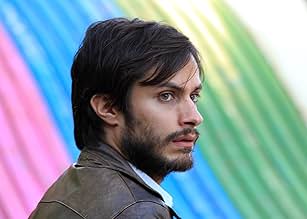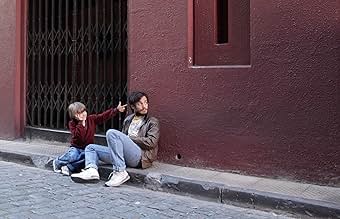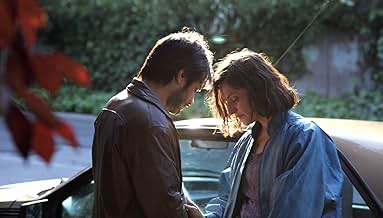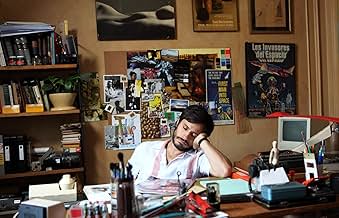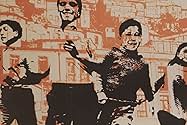Ein Werbefachmann in Chile lässt sich eine Kampagne einfallen, um Augusto Pinochet 1988 bei seinem Referendum zu schlagen.Ein Werbefachmann in Chile lässt sich eine Kampagne einfallen, um Augusto Pinochet 1988 bei seinem Referendum zu schlagen.Ein Werbefachmann in Chile lässt sich eine Kampagne einfallen, um Augusto Pinochet 1988 bei seinem Referendum zu schlagen.
- Regie
- Drehbuch
- Hauptbesetzung
- Für 1 Oscar nominiert
- 15 Gewinne & 28 Nominierungen insgesamt
Empfohlene Bewertungen
Overall, this film is mildly interesting but should have been a lot better. For a better look at the Pinochet administration, try watching the three "Battle of Chile" films. Additionally, for a better film that is critical of repression in South America, try the Oscar-winning "The Official Story"--a film that has heart, emotion and is much harder-hitting in the way it addresses the fall of the Argentinian regime.
Good PR work that frames the debate and sets the narrative for the campaign wins political campaigns.
The movie is thoughtful, funny, absorbing. Quality all around. You don't need to know anything about Chile to get swept up by it, and if there are details you want to know, you can go read about it afterwards.
I especially liked that it looked like a documentary video and a time- capsule from that era. It seamlessly mixes stock footage with filmed stuff to give it a dated look.
See it.
No is one of those films which I wasn't looking forward to seeing because I just wasn't interested in the subject matter. I'm not into historical political movies, but this film was much more than that. No works more as a media satire than an actual political movie. The satire works really well and it reminds us of how important the media can be in our society. No should be required viewing for all advertising students in schools around the globe. The film works in great part thanks to Gael Garcia Bernal's performance as the ad executive who comes up with the campaign for No in the referendum. Bernal has proved in the past that he's a very reliable actor, and one of the best in Latin America. The film also has great direction from Pablo Larraín, who decided to shoot the film using U-matic video tape to give it a more 80's vibe since that was the type of video which was used then. That brought a sense of realism to the movie, and at times it felt like a documentary. This was a well crafted film, and a decent contender for best foreign film of the year. It lost to Amour in the Oscars, but received a lot of love in the Cannes Festival last year. The screenplay was very well adapted by Pedro Peirano (who also wrote the screenplay for 2009's The Maid, a well received Chilean film) from Antonio Skarmeta's (famous for his novel Il Postino) play. This is one art house film you won't regret watching.
It's the end of the 80's and Chilean dictator, Augusto Pinochet, has called for a national referendum after being pressured by international organisms. After 15 years of dictatorship, Pinochet is allowing the country to vote Yes or No to him extending his rule for 8 more years in the country. Everyone is convinced that this is all a farce and just a means for Pinochet to legalize his authority. Pinochet is also convinced he will win the elections considering that he has brought economic stability to the country. For 27 days both parties will be allowed to have a 15 minute spot of uninterrupted television air time in which they can campaign. This is where the young ad executive known as Rene Saavedra (Gael Garcia Bernal) comes to play. The No coalition decides to hire him to lead their campaign, but what they don't realize is that he will bring a unique approach to the campaign. Since Pinochet's dictatorship was known for its brutal intimidation and censorship, everyone in the No coalition expects to make their voice heard and focus on the violence and brutality of his government, but Saavedra has a different view: He wants to make a joyful, colorful, and upbeat campaign where the primary message is that ¨Chile: happiness is coming.¨ Everyone in the campaign is upset about this, including Saavedra's ex wife, Veronika (Antonia Zegers), who thinks all this is just a waste of time. However, the campaign begins resonating with voters, and Pinochet's people decide to hire Saavedra's boss, Lucho Guzman (Alfredo Castro), to counteract the comedic and joyful campaign. Things won't be easy for the No coalition because the government begins intimidating and pressuring them through violence, but Saavedra knows that his campaign can change the course of the country for the better.
Advertising is a powerful weapon in today's world, and more than ever we see governments trying to control and censor the media. The reason being that they know that it can shift elections and bring down tyrannical leaders. That is why more than ever, we must fight to keep governments from trying to control or censor the media. What a lot of politics have done is use advertising wisely to get elected. The film is a great case study on politics and media and how they are correlated. No is a film everyone involved in media and politics should see because it shows the advantages and disadvantages that this medium has. Pablo Larrain has directed a powerful film which teaches us how the media can influence public opinion so easily. If only we could have more uplifting and joyful political campaigns like this I would be much more interested in voting. I vote yes: go see this movie.
http://estebueno10.blogspot.com/
The time is 1988 and Pinochet has been in power since 1973. In a calculated move to mitigate external pressure against his ironfisted regime, Pinochet confidently initiates a national referendum calling on citizens to vote and decide, whether an eight-year extension into 1996 is valid. The probabilities of course, are carefully measured and his likelihood of winning is rock solid.
In this heartfelt homage to Chilean history, both sides are attempting to secure voters by fighting it out via 30-minute spots on TV — 15- minutes for the "Yes" camp and 15-minutes for "No".
An agency that employs René has been commissioned to design a series of ads for the Government of Junta; with bossman Luis Guzmán (Alfredo Castro) helping Pinochet. Conflicts of interest arise when René exercises his liberty as a freelancer in contra — to formulate the opposition's campaign.
Story begins with a cold open showing creative grit — René is previewing a new commercial with clients in the beverage industry. Within the first few minutes, we find out who he really is — a shrewd and introspective creative director, highly sought after in the business, bit of a rebel in the vein of Don Draper — someone who believes in unorthodox methods and selling the notion of freedom.
A sudden visit from opposition manager José Tomás Urrutia, interrupts his meeting with the clients. In conversations between René and José interfused with a dinner scene between René and his boss, Luis — we drift through a climate of skepticism surrounding the legitimacy of Pinochet's reign, residual fears evolved from the red scare, and reservations about United States after their alleged involvement in the Chilean Coup of 1973. Accusations and recriminations are spewed in hushed, civil tones. Disparity in views (as they are in life) are documented in raw, unfiltered strides.
In a sequence depicting René's journey home on a skateboard, audacious visual-aural symphony amplifies his transformation, and the situation about to unfold. A representative of young blood, it is here that Larrain's spunky protagonist displays progressive streak coursing through his veins, thus establishing an emotional, life-affirming choice provoked by his earlier exchange with Luis.
The film charts two narrative blueprints juxtaposed next to each other: the No campaign from inception to post-referendum, and how it is inextricably linked to René's democratic ideology. Against the backdrop of fierce competition between both camps, his middle-class existence as a single father still harboring feelings for the ex-wife comes into close, thematic focus.
When public opinion becomes cultural movement and things begin to swing in favor of No's provocative campaign; hinting at political activism cleverly cloaked in neutral concepts such as love, happiness and freedom, Pinochet's lackeys begin a series of menacing threats that hover in dangerous, unpredictable shadows. Shot with an aspect ratio of 4:3 using analogue tape; the format also implies a cautionary facet to this film — concerned with lasting effects created by commercials in the heydays of TV, suggesting how a simple medium and viral marketing can radically influence political views of the masses, creating landslide victories for the underdog.
Things comes to a hauntingly ironic conclusion, that much is obvious, but No is a tremendously simple film that burns with quiet ferocity. Pablo Larrain displays talent in using visual moods, incisive dialog and dramatic scores; giving shape to the social atmosphere in 1980s Chile — rife with unquenchable thirst for liberty and change, yet pensive and scarred by a violent past.
Although punctuated with flashes of humor and scathing wit, this Oscar nominee in foreign language category is an intense historical drama that works on a deeper level by finding resonance with universal emotions. Passion seeps through every frame, culminating in a mood most aptly expressed by Tchaikovsky's valse sentimentale.
cinemainterruptus.wordpress.com
Pinochet's government were an arrogant bunch; 15 years of dictatorship will do that to you, to the point that the election was largely seen as a farcical exercise merely to validate his rule.
So, the fact that this election campaign won a seemingly un-winnable election and validate real democracy in that it began the end of Pinochet's rule is still a pretty incredible turn of events.
The film itself tells the story of Rene Saavedra (Gael García Bernal) an in demand advertiser with a troubled home life who spearheads the NO campaign by putting a positive, consumerist spin on it with plenty of humour to be had... www.ravechild.co.uk
Wusstest du schon
- WissenswertesSeveral people from the actual "No" campaign in Chile were hired to play members of the "Yes" campaign in the film.
- PatzerAlle Einträge enthalten Spoiler
- Zitate
Publicista Campaña Sí: [Speaking to the YES Campaign board] If you want to scare people, you have to scare them with their past, their past poverty, long lines to buy bread. The opposition has its cries of socialism, yes. But the only thing that interests people is the scramble, and also they know that socialism is miserable. Instead you have a system in which anyone can be rich. Attention!, not 'everyone'... 'anyone'. You can not lose when all are committed to be that 'anyone'.
- Crazy CreditsThe opening and closing credits all feature easel paper pads with prologue, title and ending credit roll call, showing a person's hands flipping over each page.
- VerbindungenEdited into No, la serie (2014)
- SoundtracksLa alegria ya viene
Written by Sergio Bravo & Jaime de Aguirre
Top-Auswahl
Details
- Erscheinungsdatum
- Herkunftsländer
- Offizielle Standorte
- Sprache
- Auch bekannt als
- Нi
- Drehorte
- Produktionsfirmen
- Weitere beteiligte Unternehmen bei IMDbPro anzeigen
Box Office
- Bruttoertrag in den USA und Kanada
- 2.343.664 $
- Eröffnungswochenende in den USA und in Kanada
- 71.742 $
- 17. Feb. 2013
- Weltweiter Bruttoertrag
- 7.699.095 $
- Laufzeit1 Stunde 58 Minuten
- Farbe
- Sound-Mix
- Seitenverhältnis
- 1.40 : 1
Zu dieser Seite beitragen


![Tráiler [OV] ansehen](https://m.media-amazon.com/images/M/MV5BODAzODZiZjEtNWY5Zi00NDU3LWI1NzEtNGZlNDk2YjBlMzkwXkEyXkFqcGdeQXRodW1ibmFpbC1pbml0aWFsaXplcg@@._V1_QL75_UY281_CR7)





